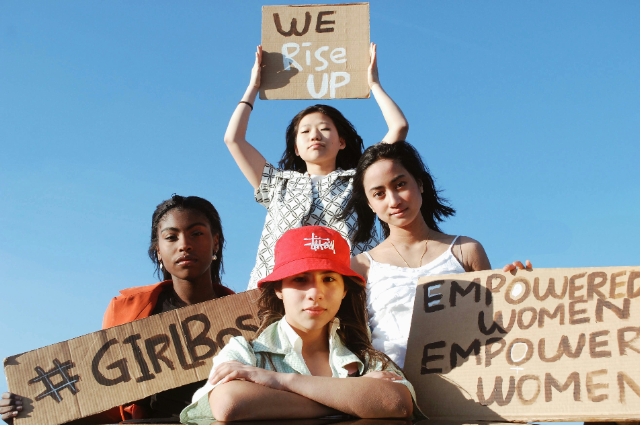
Photo by Natalie Hua on Unsplash
I recently came across various posts, reels, and content addressing gender equality, rights, and opportunities across different areas, including discussions on normalizing concerns such as PMS and special treatment for women. While these are important conversations, I feel the need to address certain facts and perspectives often overlooked in these discussions. At its core, all of these conversations fall under the broader term of feminism.
Understanding Feminism...
Feminism is an ideology that advocates for gender equality, ensuring equal rights and opportunities in education, politics, and society. It is fundamentally a movement against unfair treatment based on gender and aims to create a world where everyone is treated fairly. Unlike specific laws or acts solely dedicated to feminism, we are governed by broader legal frameworks, rules, and policies that support gender equity.
Addressing Male Challenges in Society
While feminism aims for equality, an important question arises: How are male emotions, skills, and contributions acknowledged in today's generation? Gender equality should mean fairness for all, but some critical challenges faced by men often receive less attention.
Are we having enough conversations about the struggles men face? Are their mental health concerns and emotional struggles given the same recognition as those of women
Is feminism misused by some women?
Like any movement, feminism has occasionally been misused by individuals for personal gain, misrepresentation, or to push agendas that deviate from its core principle of gender equality. However, isolated instances of misuse should not define the entire movement.
Why is Feminism Important?
Feminism plays a crucial role in:
- Advocating for women's reproductive rights and healthcare.
- Fighting against gender-based violence and harassment.
- Encouraging representation and leadership opportunities for women in politics, business, and media.
Challenges Faced by Men
Male victims of violence and abuse:
Domestic violence and sexual abuse against men are often ignored or ridiculed, making it harder for male victims to seek justice or support. Many men fear reporting abuse due to societal stigma or disbelief.
Feminism, in its true sense, fights for justice and recognition of all victims, regardless of gender, by challenging stereotypes that only women suffer from abuse.
Shouldn’t we be working towards a society where all victims are heard and supported equally?
How can we encourage more open conversations about male victims of violence?
Body image and unrealistic standards:
Just like women, men face unrealistic body expectations, with society glorifying muscular, tall, and "alpha male" physiques. This can lead to body dysmorphia , steroid abuse, and low self-esteem among men who don’t fit these ideals. Feminism should challenge harmful beauty standards for all genders, promoting body positivity and self-acceptance.
Workplace discrimination and dangerous jobs:
Men are often expected to take on physically dangerous jobs (construction, military, mining, etc.), leading to higher workplace injury and fatality rates. Society discourages men from entering caregiving fields such as nursing, teaching, or early childhood education, labeling them as "women’s work." Feminism should promote freedom of career choice for everyone, ensuring men can pursue traditionally "feminine" jobs without stigma.
Feminism and True Equality: Recognizing Achievements Without Bias
Feminism, at its core, advocates for equal opportunities and recognition. However, recent trends show that some achievements receive disproportionate celebration, overshadowing similar accomplishments by men.
For instance, astronaut Sunita Williams’ extended space mission was widely celebrated in the media, while her male colleague, Barry "Butch" Wilmore, received significantly less attention, despite sharing the same mission and conditions. If equality is the goal, then recognition should be based on merit rather than selective amplification.
Shouldn’t accomplishments be celebrated equally, regardless of gender?
Social Media and Gender Representation
Are female creators ruling social media while skilled male creators struggle for recognition?
Social media has reshaped content creation, with female creators often receiving more engagement, visibility, and brand partnerships. However, does this trend come at the cost of skilled and knowledgeable male creators being overlooked?
- Women dominate in beauty, fashion, and wellness spaces due to audience preferences.
- Professional niches like finance often see women facing credibility bias.
- Men may struggle with engagement, as social media algorithms favor emotionally engaging and aesthetic-driven content.
Statistical highlights on social media reach:
To support this discussion, studies indicate that:
- Women receive 38% more engagement on Instagram compared to male influencers, particularly in lifestyle content.
- In business- and finance-related niches, male creators get fewer brand partnerships but tend to receive higher shares rather than likes and comments.
- Algorithms favor visually appealing content, which indirectly benefits creators in industries where aesthetics matter more.
Feminism in the digital era should push for balance, where both men and women are valued for their skills and expertise across all industries.
Evolving the Conversation Around Feminism
Feminism is not about elevating women over men but creating a world where everyone, regardless of gender, can live freely without restrictive roles or unfair disadvantages. By challenging stereotypes, feminism should help men break free from emotional suppression, workplace pressures, unfair parental expectations, and harmful masculinity norms.
A growing trend is also the increased discussion of personal topics, such as menstruation, in ways that sometimes extend beyond awareness into unnecessary overexposure. While menstrual health is vital, using it to demand special treatment rather than equality can create discomfort and disrupt mutual respect. Such discussions should focus on education and understanding rather than alienation.
As society moves forward, the conversation around feminism must evolve. It should not be about competing narratives of superiority but about ensuring that both men and women are equally recognized for their contributions. True gender equality can only be achieved when accomplishments, struggles, and voices are acknowledged fairly, without bias or selective emphasis.
